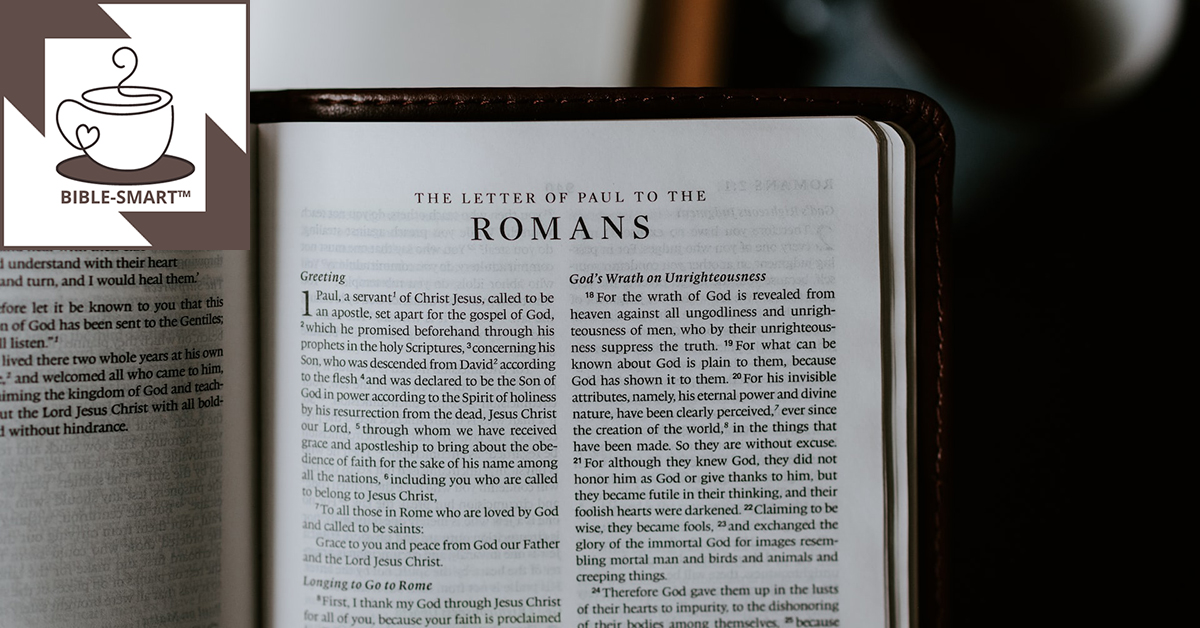I am (if nothing else) a curious person.
Sometimes that gets me in trouble, like when I decided to find out what would happen if I jumped over a college balcony. I discovered—too late—it was almost two stories high. (Yeah, I impressed the girl…but I also limped around campus for a week!)
Other times, my curious nature is an unexpected blessing. Take today for instance: I was trying to remember a certain Scripture, couldn’t get it right, and suddenly wondered, “What if I could never again open my Bible? What would I do then?”
I’ve known some rare folk who’ve memorized entire books of Scripture. I also know that’s not me. But:
What if I tried to memorize just one key thought from each of the 66 books of the Bible? What would those 66 verses be?
That made me curious. So, here are 66 key verses that may help you remember the story, message, or meaning inherent in each of the 66 Bible books.
I hope these 66 key verses serve as a helpful—and hopeful—reference for you, too.
§ § §
Key Verses: Genesis to Joshua
“So God created man in his own image, in the image of God created he him; male and female created he them.” – Genesis 1:27 KJV
“I am the Lord your God, who rescued you from the land of Egypt, the place of your slavery. You must not have any other god but me.” – Exodus 20:2-3 NLT
“Do not seek revenge or bear a grudge against anyone among your people, but love your neighbor as yourself.” – Leviticus 19:18 NIV
“God is not a man, that he might lie, or a son of man, that he might change his mind. Does he speak and not act, or promise and not fulfill?” – Numbers 23:19 CSB
“Love the Lord your God with all your heart, with all your soul, and with all your strength.” – Deuteronomy 6:5 CSB
“Be strong and courageous. Do not be frightened, and do not be dismayed, for the Lord your God is with you wherever you go.” – Joshua 1:9 ESV
§ § §
Key Verses: Judges to 2 Kings
“The Lord raised up judges to rescue the Israelites from their attackers. Yet Israel did not listen to the judges …” – Judges 2:16-17 NLT
“Where you go I will go, and where you stay I will stay. Your people will be my people and your God my God.” – Ruth 1:16 NIV
“The Lord does not see as man sees; for man looks at the outward appearance, but the Lord looks at the heart.” – 1 Samuel 16:7 NKJV
“The Lord is my rock, and my fortress, and my deliverer.” – 2 Samuel 22:2 KJV
“Lord God of Israel, there is no God like you in heaven above or on earth below, who keeps the gracious covenant with your servants who walk before you with all their heart” – 1 Kings 8:23 CSB
“And when they gave it to the people, there was plenty for all and some left over, just as the Lord had promised.” – 2 Kings 4:44 NLT
§ § §
Key Verses: 1 Chronicles to Job
“Both riches and honor come from You, and You rule over all, and in Your hand is power and might; and it lies in Your hand to make great and to strengthen everyone.” – 1 Chronicles 29:12 NASB
“If My people who are called by My name will humble themselves, and pray and seek My face, and turn from their wicked ways, then I will hear from heaven, and will forgive their sin and heal their land. ” – 2 Chronicles 7:14 NKJV
“Ezra had set his heart to study the law of the Lord and to practice it.” – Ezra 7:10 NASB
“The joy of the Lord is your strength.” – Nehemiah 8:10 KJV
“And who knows but that you have come to your royal position for such a time as this?” – Esther 4:14 NIV
“Though he slay me, yet will I trust in him.” – Job 13:15 KJV
§ § §
Key Verses: Psalms to Jeremiah
“I remain confident of this: I will see the goodness of the Lord in the land of the living. Wait for the Lord; be strong and take heart and wait for the Lord.” – Psalm 27:13-14 NIV
“Trust in the Lord with all your heart, and do not lean on your own understanding.” – Proverbs 3:5 ESV
“He has made everything beautiful in its time.” – Ecclesiastes 3:11 ESV
“He has brought me to his banquet hall, and his banner over me is love” – Song of Songs 2:4 NASB
“For unto us a child is born, unto us a son is given: and the government shall be upon his shoulder: and his name shall be called Wonderful, Counsellor, The mighty God, The everlasting Father, The Prince of Peace.” – Isaiah 9:6 KJV
“When I discovered your words, I devoured them. They are my joy and my heart’s delight.” – Jeremiah 15:16 NLT
§ § §
Key Verses: Lamentations to Amos
“Because of the Lord’s faithful love we do not perish, for his mercies never end. They are new every morning; great is your faithfulness!” – Lamentations 3:22-23 CSB
“As surely as I live, says the Sovereign Lord, I take no pleasure in the death of wicked people. I only want them to turn from their wicked ways so they can live.” – Ezekiel 33:11 NLT
“Those who are wise will shine as bright as the sky, and those who lead many to righteousness will shine like the stars forever.” – Daniel 12:3 NLT
“For I desire mercy, not sacrifice, and acknowledgment of God rather than burnt offerings.” – Hosea 6:6 NIV
“Whoever calls on the name of the Lord shall be saved.” – Joel 2:32 NKJV
“He who forms mountains and creates the wind and declares to man what are His thoughts, He who makes dawn into darkness and treads on the high places of the earth, The Lord God of hosts is His name.” – Amos 4:13 NASB
§ § §
Key Verses: Obadiah to Zephaniah
“As you have done, it shall be done to you; your deeds shall return on your own head.” – Obadiah 1:15 ESV
“I know that You are a gracious and merciful God, slow to anger and abundant in lovingkindness.” – Jonah 4:2 NKJV
“He has shown you, O mortal, what is good. And what does the Lord require of you? To act justly and to love mercy and to walk humbly with your God.” – Micah 6:8 NIV
“The Lord is good, a refuge in times of trouble. He cares for those who trust in him.” – Nahum 1:7 NIV
“The Lord God is my strength; He will make my feet like deer’s feet, And He will make me walk on my high hills.” – Habakkuk 3:19 NKJV
“The Lord your God is in your midst, a mighty one who will save; he will rejoice over you with gladness; he will quiet you by his love.” – Zephaniah 3:17 ESV
§ § §
Key Verses: Haggai to Luke
“Then Haggai, the Lord’s messenger, gave the people this message from the Lord: ‘I am with you, says the Lord.’” – Haggai 1:13 NLT
“Rejoice greatly, Daughter Zion! Shout, Daughter Jerusalem! See, your king comes to you, righteous and victorious, lowly and riding on a donkey.” – Zechariah 9:9 NIV
“But to you who fear My name The Sun of Righteousness shall arise with healing in His wings.” – Malachi 4:2 NKJV
“Do not think that I have come to abolish the Law or the Prophets; I have not come to abolish them but to fulfill them.” – Matthew 5:17 ESV
“Let the little children come to me, and do not hinder them, for the kingdom of God belongs to such as these.” – Mark 10:14 NIV
“For unto you is born this day in the city of David a Saviour, which is Christ the Lord.” – Luke 2:11 KJV
§ § §
Key Verses: John to Galatians
“Simon Peter answered, “Lord, to whom will we go? You have the words of eternal life.” – John 6:68 CSB
“There is salvation in no one else! God has given no other name under heaven by which we must be saved.” – Acts 4:12 NLT
“But God demonstrates his own love for us in this: While we were still sinners, Christ died for us.” – Romans 5:8 NIV
“Love is patient, love is kind. Love does not envy, is not boastful, is not arrogant, 5 is not rude, is not self-seeking, is not irritable, and does not keep a record of wrongs.” – 1 Corinthians 13:4-5 CSB
“Therefore, if anyone is in Christ, he is a new creation; old things have passed away; behold, all things have become new.” – 2 Corinthians 5:17 NKJV
“There is neither Jew nor Greek, there is neither slave nor free man, there is neither male nor female; for you are all one in Christ Jesus.” – Galatians 3:28 NASB
§ § §
Key Verses: Ephesians to 1 Timothy
“Now to Him who is able to do exceedingly abundantly above all that we ask or think, according to the power that works in us, to Him be glory.” – Ephesians 3:20-21 NKJV
“Be anxious for nothing, but in everything by prayer and supplication with thanksgiving let your requests be made known to God.” – Philippians 4:6 NASB
“Christ is the visible image of the invisible God. He existed before anything was created and is supreme over all creation, for through him God created everything in the heavenly realms and on earth.” – Colossians 1:15-16 NLT
“Pray without ceasing.” – 1 Thessalonians 5:17 KJV
“But as for you, brothers and sisters, do not grow weary in doing good.” – 2 Thessalonians 3:13 CSB
“Don’t let anyone look down on you because you are young, but set an example for the believers in speech, in conduct, in love, in faith and in purity.” – 1 Timothy 4:12 NIV
§ § §
Key Verses: 2 Timothy to 1 Peter
“All Scripture is breathed out by God and profitable for teaching, for reproof, for correction, and for training in righteousness.” – 2 Timothy 3:16 ESV
“He saved us—not by works of righteousness that we had done, but according to his mercy.” – Titus 3:5 CSB
“I thank my God always when I remember you in my prayers, because I hear of your love and of the faith that you have toward the Lord Jesus and for all the saints.” – Philemon 1:4-5 ESV
“Let us therefore come boldly unto the throne of grace, that we may obtain mercy, and find grace to help in time of need.” – Hebrews 4:16 KJV
“Every good and perfect gift is from above, coming down from the Father of lights, who does not change like shifting shadows.” – James 1:17 CSB
“Each of you should use whatever gift you have received to serve others, as faithful stewards of God’s grace in its various forms.” – 1 Peter 4:10 NIV
§ § §
Key Verses: 2 Peter to Revelation
“By his divine power, God has given us everything we need for living a godly life.” – 2 Peter 1:3 NLT
“Dear friends, do not believe every spirit, but test the spirits to see if they are from God, because many false prophets have gone out into the world.” – 1 John 4:1 CSB
“I am writing to remind you, dear friends, that we should love one another. This is not a new commandment, but one we have had from the beginning.” – 2 John 1:5 NLT
“Beloved, do not imitate evil but imitate good. Whoever does good is from God; whoever does evil has not seen God.” – 3 John 1:11
“Be merciful to those who doubt.” – Jude 1:22 NIV
“And God shall wipe away all tears from their eyes; and there shall be no more death, neither sorrow, nor crying, neither shall there be any more pain: for the former things are passed away.” – Revelation 21:4 KJV
§ § §
View or Download This Article as a PDF File
To download, click on the “down arrow” icon at the top right corner of the control panel below.
Have a question about the Bible? Use the Ask link to submit your question for future consideration on Bible-Smart.com.
Looking for more? Check out these links:













